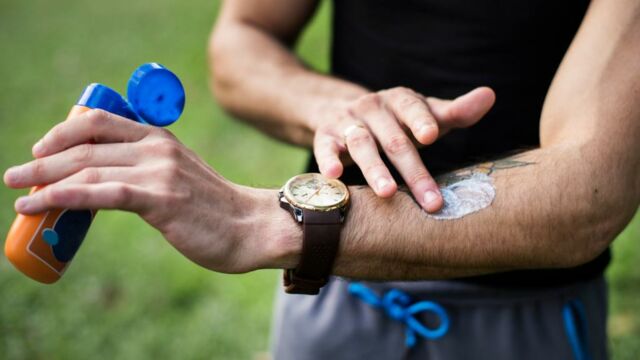During the summer, sun cream is your best friend against those sunburns that can leave you red as a lobster. It protects your skin from the harmful effects of UV rays, slowing down the skin's aging process, and limiting the risk of cancer. However, this is only the case if you know how to choose the right sun cream and apply it correctly.
Discover our latest podcast
How does the protection factor work?
Sun cream can offer different degrees of protection, from SPF 2 to SPF 100. While SPF 2 allows 50% of erythematous UV rays (which can cause sunburns) to pass through, SPF 15 blocks 93%, and SPF 50 98%. Finally, SPF 100 blocks 99% of these UV rays.
The factor is a ratio indicating the time it takes for exposure to the sun to cause damage similar to that inflicted on bare skin. For example, if your unprotected skin starts to burn after 20 minutes, a cream with an index of 30 will guarantee protection for 30 times longer: in other words, it would take 10 hours for your skin to suffer equivalent damage. This is the case as long as you apply your cream properly.
Be careful when applying it
In a recent study, researchers at King's College London measured the protection provided by sun cream according to how it is usually used. Their results showed that subjects tended to apply sun cream in much shallower layers than the 2 milligrams per square centimetre recommended by manufacturers.
Even with a high protection factor (SPF 50), the team measured at best 40% of the expected protection. 'Given that most people don't use sun creams as tested by manufacturers, it's better for people to use a much higher SPF than they think is necessary,' concluded Professor Antony Young, who took part in the study.
For it to be effective, it is therefore better to choose a cream with a higher factor. Apply it in a thick layer, and don't hesitate to reapply it, especially if you go swimming.
Beware of the ecological impact
One last thing: recent studies have shown the harmful effects certain sun creams may have on coral reefs. Oxybenzone and octinoxate, which act as ultraviolet filters in many creams, are believed to alter coral DNA, rendering corals sterile as adults, killing younger corals, and contributing to overall reef bleaching.
This harmful effect has led some regions of the world, such as Hawaii, to ban these products from their beaches. Nevertheless, the effects of these substances on humans also raise questions. The action of oxybenzone as an endocrine disruptor is still being debated by researchers.
You should, therefore, choose environmentally friendly sun creams in order to enjoy your summer and to protect yourself responsibly.















